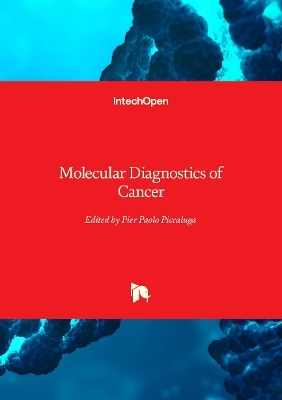
Molecular Diagnostics of Cancer
Seiten
2024
IntechOpen (Verlag)
978-1-83769-434-1 (ISBN)
IntechOpen (Verlag)
978-1-83769-434-1 (ISBN)
- Titel nicht im Sortiment
- Artikel merken
Molecular pathology has significantly advanced cancer diagnostics and treatment. The integration of molecular diagnostics and genomic information has transformed how cancer is understood and managed, offering new hope for patients and providing oncologists with powerful tools to combat the complexity of the disease.
Precision medicine, also known as personalized medicine, is an innovative approach to medical treatment and diagnosis that takes into account individual variability in genes, environment, and lifestyle for each person. In the context of cancer, precision medicine aims to tailor medical care to the specific genetic and molecular characteristics of each patient's tumor. This allows for more targeted and effective treatments, minimizing side effects and improving outcomes.
The first step in precision medicine, especially in oncology, is represented by an accurate diagnosis, including molecular and genetic data. A comprehensive assessment in molecular pathology includes conventional and more innovative techniques, including polymerase chain reaction (PCR)-based approaches, Sanger sequencing, and next-generation sequencing for genomic profiling.
Precision medicine relies on the analysis of the patient's genomic information, including the DNA mutations present in their tumor. Genomic profiling helps identify specific genetic alterations that are driving the growth of cancer cells. This information is crucial for selecting targeted therapies that directly interfere with these specific molecular abnormalities.
In addition, molecular diagnostics provide:
• biomarker identification
• tumor heterogeneity assessment
In turn, this translates into direct treatment decision support. The information obtained through molecular tests guides oncologists in making more informed decisions about the most appropriate treatments for individual patients. This can include targeted therapies, immunotherapies, or other interventions based on the specific molecular profile of the tumor. Prognostication becomes treatment-specific (prediction) and predictive models can be developed by integrating genetic and molecular data with clinical information, to estimate the likelihood of treatment response, recurrence, and overall prognosis.
Overall, molecular pathology has significantly advanced cancer diagnostics and treatment, leading to improved outcomes and a shift toward more personalized and effective care. The integration of molecular diagnostics and genomic information has transformed how cancer is understood and managed, offering new hope for patients and providing oncologists with powerful tools to combat the complexity of the disease.
Precision medicine, also known as personalized medicine, is an innovative approach to medical treatment and diagnosis that takes into account individual variability in genes, environment, and lifestyle for each person. In the context of cancer, precision medicine aims to tailor medical care to the specific genetic and molecular characteristics of each patient's tumor. This allows for more targeted and effective treatments, minimizing side effects and improving outcomes.
The first step in precision medicine, especially in oncology, is represented by an accurate diagnosis, including molecular and genetic data. A comprehensive assessment in molecular pathology includes conventional and more innovative techniques, including polymerase chain reaction (PCR)-based approaches, Sanger sequencing, and next-generation sequencing for genomic profiling.
Precision medicine relies on the analysis of the patient's genomic information, including the DNA mutations present in their tumor. Genomic profiling helps identify specific genetic alterations that are driving the growth of cancer cells. This information is crucial for selecting targeted therapies that directly interfere with these specific molecular abnormalities.
In addition, molecular diagnostics provide:
• biomarker identification
• tumor heterogeneity assessment
In turn, this translates into direct treatment decision support. The information obtained through molecular tests guides oncologists in making more informed decisions about the most appropriate treatments for individual patients. This can include targeted therapies, immunotherapies, or other interventions based on the specific molecular profile of the tumor. Prognostication becomes treatment-specific (prediction) and predictive models can be developed by integrating genetic and molecular data with clinical information, to estimate the likelihood of treatment response, recurrence, and overall prognosis.
Overall, molecular pathology has significantly advanced cancer diagnostics and treatment, leading to improved outcomes and a shift toward more personalized and effective care. The integration of molecular diagnostics and genomic information has transformed how cancer is understood and managed, offering new hope for patients and providing oncologists with powerful tools to combat the complexity of the disease.
| Erscheint lt. Verlag | 10.4.2024 |
|---|---|
| Verlagsort | London |
| Sprache | englisch |
| Maße | 175 x 254 mm |
| Themenwelt | Naturwissenschaften ► Biologie ► Genetik / Molekularbiologie |
| ISBN-10 | 1-83769-434-6 / 1837694346 |
| ISBN-13 | 978-1-83769-434-1 / 9781837694341 |
| Zustand | Neuware |
| Haben Sie eine Frage zum Produkt? |
Mehr entdecken
aus dem Bereich
aus dem Bereich
Buch | Hardcover (2021)
John Wiley & Sons Inc (Verlag)
CHF 169,95


